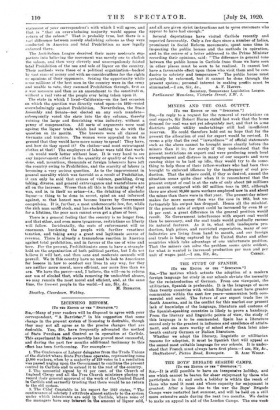MINERS AND THE COAL OUTPUT.
(To THE EDITOR or THE " SPECTLTOR.") SIR,—In reply to a request for the removal of restrictions on coal exports, Sir Robert Horne stated last week that the home demand for coal was not yet adequately met, and that in acme districts public utility undertakings still had insufficient reserves. He could therefore hold out no hope that for the present the allocation of coal for export would be revised. It seems a pity that the real "inwardness" of official statements such as the above cannot be brought more clearly before the miners than it is; for surely if they understood that the present restrictions on export coal were producing much local unemployment and distress in many of our seaports and were causing ships to be laid up idle, they would try to do some- thing to help those of their fellow-workers who had been thus brought to enforced idleness by the inadequacy of coal pro- duction. That the miners could, if they so desired, amend the situation seems quite clear when it is remembered that the present output of coal is at the rate of only about 240 millions per annum compared with 287 million tons in 1913, although there are about 90,000 more workers employed now in and about the mines than there were in that year. The present-day miner makes far more money than was the case in 1913, but un- fortunately his output has dropped. Hence all the mischief. If the present rate of output could be increased by even 10 or 15 per cent. a great difference in the general position would result. No Government interference with export coal would then be necessary, and the coal trade would gradually resume its natural features. As it is, what with inadequate pro- duction, high prices, and restricted exportation, many of our industries are living from hand to mouth, and our foreign coal trade is being captured by the United States and other countries which take advantage of our unfortunate position. That the miners can solve the problem seems quite evident, for what is wanted is increased production per man and per
unit of wages paid.—I am, Sir, &c., CARBON.


































 Previous page
Previous page